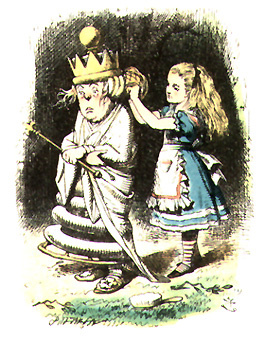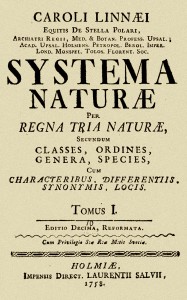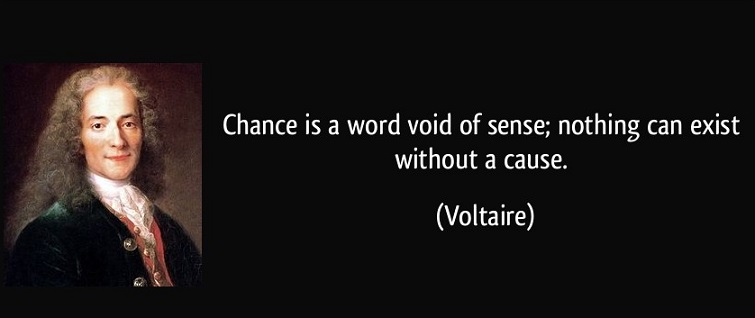Someone at BioLogos dismissed my distinction between providence and miracles, by saying that there is “nature” and there are “miracles” and nothing else and it’s simple. There’s little point in replying there because, apart from a rather dense thread made contentious by the usual suspects, if he won’t even investigate the army of theologians and philsophers I cited for the last two thousand years on the doctrine of providence (the Fathers, the Scholastics, the Reformers, Wesley and even Arminius), he surely won’t pay any attention to me. To some ECs holding the “intellectual high ground” means one needn’t engage with not only ones opponents in ID or YEC, but ones predecessors in the faith.
But it may be of use to some readers here to see some reasons why it’s not practically good, for the concept of a truly theistic evolution, to divide the world up into a “natural” and “miraculous” dualism. It is certainly theologically wrong, for it maintains the deistic (and I’ll still use that word, despite the recent protests that Evangelicals of whom it is used are not true Deists – that’s true, for they lack the logical consistency of the Deists)… the deistic conception that “nature” runs happily without God, and that “miracles” are an interference with that normal running.
Now, the biblical understanding of “miracles” certainly has the meaning of something outside the normal run of things, though without any specific “theory” as to what, exactly, God is doing differently. In the New Testament, the two words mean “[work of] power” and “sign“, the former emphasising the special demonstration of God’s power, and the latter the meaning of a supernatural demonstration. When Jesus turns water into wine, then, he is both doing something outside the normal pattern of things, and signifying the way that the Kingdom itself will transform that order into something entirely new, and as John says “thus revealed his glory”.
If we make such a twofold division our assumption with regard to nature, however, some problems soon become obvious to many, if not to my BioLogos interlocutor. Category errors lead quite logically to erroneous conclusions, which is why categories need to be clear.
The first problem is the “incompetent God” argument that the early Deist Leibniz used against Newton. What kind of clockmaker would make a machine that needed to be constantly adjusted by miraculous interventions? For God to have to tinker with nature means he can’t have designed it very well. How that “precision made” view of natural law fits with the belief that nature is not rigidly deterministic (partly because Calvin mustn’t get a foot in the door) I can’t fathom, because they seem mutually contradictory. But to them as believe it, both can apparently be true at once.
The erroneous assumptions underlying this are twofold: the first is that things that happen “by the nature of things” (ie by natural law) are a machine functionally independent of God, like an automaton. The second is that miracles are interferences in the running of that automaton from the outside. Turning water into wine is fine once, but if it happens all the time God perhaps ought to have made less water and more wineries in the first place.
In fact, though, the regularities studied by science (or just appreciated in daily life) are, as Ps 89 says, signs of God’s faithfulness, not of the world’s fixity: that they employ genuine secondary causes is a theological and philosophical choice (against occcasionalism), but that makes no difference to their being an established baseline for living in the world, not a constraint on God. If I base a song on a repeated riff, forming a regular pattern for the piece, I may play it or program some instrument to play it, and it is still completely my work, to be varied for interest or kept the same for uniformity at my pleasure. Even philosophers of science, of course, realise that “laws” are derived from observations of what usually happens, not rules of what ought to happen – scientists are sometimes less careful, and the Enlightenment kind certainly were, for reasons I’ll mention later.
 But the necessary result of thinking of any “direct” actions of God as “miraculous interferences” is to lead one to minimize their frequency, if only to maintain the value of the currency of true miracles. And so many TEs, wishing to defend God from the charge of incompetence or compulsive magicianship, become semi-deists in believing that if God acts in that way, it
But the necessary result of thinking of any “direct” actions of God as “miraculous interferences” is to lead one to minimize their frequency, if only to maintain the value of the currency of true miracles. And so many TEs, wishing to defend God from the charge of incompetence or compulsive magicianship, become semi-deists in believing that if God acts in that way, it  must surely be rarely. I’m pretty sure, therefore, that many TEs have an idea, based on the exceptionality of mankind, that God “intervened” to make man – but not aardvarks, zorillas and everything else between, which arose “naturally”. Otherwise each species, and even each mutation leading to them in evolution, would be a miracle, and nothing in the world natural.
must surely be rarely. I’m pretty sure, therefore, that many TEs have an idea, based on the exceptionality of mankind, that God “intervened” to make man – but not aardvarks, zorillas and everything else between, which arose “naturally”. Otherwise each species, and even each mutation leading to them in evolution, would be a miracle, and nothing in the world natural.
Related to this is the idea that such wholesale miracle-mongering would be a deception on the human race. This complaint holds less water, in that there is no inherent right for mankind (or its scientists) to untangle a regular, lawlike, causal network between every event. Still, with the mental concept of providence as “miracle” in place, too much of it seems like destroying the idea of “normality” at all, like a bad fairy story in which every problem is instantly solved by the wizard’s spells.
Of course, one way this is expressed is as the “dignity” of created causes to be able to get on with their jobs without the boss changing every memo they write or elbowing them aside to do the job himself. That “dignity” is a dangerous beast, easily becoming the template for the personification of nature and the “free process” theology that regards a providential God as a puppet-master (to use John Polkinghorne’s term). But it carries some weight even in instrumental terms: if natural processes were created to do a job, and the Creator keeps operating manual override, it’s the old “micromanagement” canard: God is the ultimate busybody in everybody else’s affairs.
The answer to all these is that providence is not miracle, and that nature was never created so that it would produce “normality”. In a simple, but valid human analogy,  nature was created as a set of tools or instruments by which God creates normality – or if he chooses, exceptionality. A host of metaphors can illustrate this: pens and printers do not write books, but writers always use them. Trumpets do not play voluntaries, but trumpeters always use them. Computers do many complex tasks – yet not a single one but to execute the will of their owners, and in many cases (such as the one I’m using right now) with the owner’s ongoing input.
nature was created as a set of tools or instruments by which God creates normality – or if he chooses, exceptionality. A host of metaphors can illustrate this: pens and printers do not write books, but writers always use them. Trumpets do not play voluntaries, but trumpeters always use them. Computers do many complex tasks – yet not a single one but to execute the will of their owners, and in many cases (such as the one I’m using right now) with the owner’s ongoing input.
The case I’ve presented here, and at BioLogos, is that although God’s activity in creation itself is outside space and time, and beyond process – being in fact one timeless act responsible for all entities and all events – yet its effects are seen in real time and may be spoken of humanly in temporal terms. We see that the universe (apparently) simply was not until space and time appeared, so that, like Genesis, we speak of an initial creation of the world. Yet we also see things in the world moving towards their intended ends, and in an evolutionary view, that those ends involve novelty and development – ardvaarks and zorillas once were not, and now are. That’s nothing new – the old theologians knew well that God is still creating human history as part of his government of the world towards its appointed end. Evolution does nothing to change things conceptually – it’s deistic thinking that does that.
I’ve suggested that, within the context of faith, “natural law” should be seen as the manifestion in creation of divine faithfulness. But “contingency” should equally be seen as the manifestation of divine freedom. It’s not that God occasionally does contingent acts, if one could only know which they are (I recall R J Russell’s uncertainty as to how often God might govern quantum events, as if sometimes they manage without him). Rather, it’s that all contingency in nature is that part of God’s work that is not regular. Miracles are an extreme example of that – but “special providence” is not miracle, because it is how God continues to act creatively in every event in the world, just as “general providence” is how God continues to act regularly by every natural law in the world.
One footnote: early modern scientists were well aware that both the faithfulness and the freedom of God needed to be maintained in science (whereas somehow modern science has made contingency Epicurean – and Christian scientists, for the most part,
leave it that way and, through clenched teeth, admit the occasional hypothetical miracle). But Bacon hoped that the study of providences, as well as of laws, might even reveal some of the patterns of God’s freedom. That was a pious hope rather than a reasoned conclusion, for God’s contingent acts are what means that the world needs to be studied empirically, rather than simply deduced from principles of reason, as the Greeks had expected.
But Bacon should have realised that it’s always a mistake to insist that human reason applies to God, and that is what the Enlightenment rationalists’ hubris assumed. Another poster on BioLogos claims that he has never read the Deists, but concludes from Scripture not only that God did create the world “in a perpetual motion”, but that if he was able to, he must have done so, or defy reason. That commenter, I’m sure, fails to appreciate how we gain our worldviews not by reading the books of thinkers, but by imbibing them from childhood once they have become common currency in a society.
For that “rational constraint” on God, in that particular form, has “Enlightenment Deism” written all over it. It inspired Leibniz in his philosophy of “the best of all possible worlds”, which (contrary to common belief) doesn’t mean this world is perfect, but that it’s the best God could conjure up under the constraints of reason. Self-contained precision was the easy part of God’s work, and therefore self-evident – which made it scandalous that a supposedly rational person like Newton couldn’t see it.
But the particular Enlightenment “mark of Cain” is in this supposition of the world as causally self-sufficient, not in the imposition of reason on God’s actions per se. For in an earlier age, it was equally self-evident that since God could create every possible species of mineral, vegetable and animal, that he was duty-bound to have done so, or be unjust to the creatures he left out of creation.
This principle of plenitude was what inspired the classification-craze of scientists like Linnaeus – somewhere there must be a creature to fill every gap in the nested heirarchy. With Darwin, of course, that “plenitude” became scattered through deep-time, and it is one unconscious justification for universal common descent (when both logic and much evidence suggests multiple origins of life). I’ve mentioned before that nested heirarchies are no more evidence for common descent than they are of mediaeval plenitude, apart from assumptions that come from beyond science.
But God doesn’t have to create everything, or even what we consider the-best-of-all-possible-worlds. He is free – and uses his freedom liberally. It’s enough that he is good, that he creates what he wants, and calls it “good”. Once we stop insisting that God must create, or allow, everything possible (so we don’t have to believe in infinite random variation either, as it happens), we can begin to see the God of providence more clearly. He is not steering the occasional privileged molecule or sperm, but, as is inherent to a monotheistic creation, directing all things toward their end by creating them and their histories.
Such a God is not an inveterate tinkerer, or a mere mechanic, or a monomaniac. He is the God of Abraham, Isaac and Jacob, the God of the Logos and the Author of life, who because of his utter transcendance is able to be seen as thoroughly, and pervasively, imminent in his creation. To imagine that any part of such a creation could remain apart from his government is as absurd as saying – well, that randomness can cause anything.
Now, say after me…






“Once we stop insisting that God must create, or allow, everything possible (so we don’t have to believe in infinite random variation either, as it happens), we can begin to see the God of providence more clearly.”
Psalm 135:6 popped into my head as I read this:
Whatever the Lord pleases, he does,
in heaven and on earth,
in the seas and all deeps.
What a humbling verse.
Noah –
It’s not impossible that that verse, and others like it, is what keeps us from laying “necessity” on God in the first place! The Deists, remember, believed that reason could take them at least as far, if not further, than revelation.
Absolutely. Just another reminder that the god of philosophers pales in comparison to the robustness of the Living God of Abraham, Isaac and Jacob (but of course, now I’m just repeating what you said in the conclusion). A great post, Jon, and just what I needed after that BL thread.
Enjoyed this one much, and it took me back to your explanations of occasionalism, concurrentism and (mere) conservationism in this post.
As you stated there, concurrentism best fits the biblical data about how God works through secondary causes. The idea is similar to compatibilism in “free will”, in that both concurrentism (nature) and compatibilism (human choice) propose that natural events/human choices are not 50% autonomous and 50% determined by God (or however one wants to divide the responsibility), but 100% autonomous and 100% determined by God. This completely obliterates the natural/supernatural division (physical/spiritual — the “seen” and the “unseen” in biblical terminology — is more appropriate, in my view), but there is a sense in which it “proves too much” from the standpoint of the design movement. If all events, not just creation and evolution, are caused by God, then it seems impossible to point out any one particular item or event in nature to showcase (not “prove”) his involvement in the process, for the skeptic will simply hold up the many counter-examples (also caused by God) that seem “random,” undesigned, or downright detrimental. The evidence will be ambiguous, at best. This does not mean concurrentism is incorrect. I am certain that it is the right biblical understanding of God’s providence. Nevertheless, the situation is comparable to trying to discern evidence of God’s action and purpose in the individual events or overall flow of human history. Unless God has specifically revealed it, we are left in the dark.
You’ve highlighted the most important implications of concurrentism for evolutionary thought, but I just want to reiterate. First, God is intimately involved in every detail of his creation, from the Big Bang to the sparrow that falls to the ground to the very hairs of your head. It is the opposite of the deist watchmaker conception. God neither blithely ignores his creation, nor occasionally corrects its course. Hebrews 1 — He upholds everything by the word of his power. Colossians 1 — In him all things hold together. Acts 17 — in him we live and move and breath. This does not mean that secondary causes are not real. They are real because God upholds and establishes them.
And, as you point out, concurrentism has implications for the entire category of “miracles.” You are right, as well, that the Bible does not present us with a philosophy of miracles. Augustine and later thinkers did that. The problem is that they divorced the concept from its biblical context. In my view, the entire categories of “supernatural” and “miracle” have strayed so far from their biblical roots as to be useless for Christian theology. We may speak of God performing a miracle and be understood by our contemporaries in the way that the word is used today, but what we mean by it is something entirely different than what the biblical authors were communicating to their original audience.
The New Testament terms were primarily “signs” (semeion) and “wonders” (teras), which corresponded to the Hebrew oth (signs) and mopheth (wonders). The NT also occasionally uses powers (dunamis) and works (ergon) to describe miraculous events, but signs and wonders are the primary terms. Usage determines meaning, and in the the Bible, “wonders” inspired awe and captivated attention, while “signs” identified and authenticated the one who spoke for God. Each time that God provided signs, they were manifested first by the primary messenger (Moses, Elijah, and Jesus), continued to be shown by their chosen successors (Joshua, Elisha, and the apostles), and resulted in a written record of the message, which the recipients regarded as the words of God. I am not a cessationist, but it is worth noting that “miracles” in the modern usage do not at all fit the biblical pattern of signs and wonders, and it is worth noting that the Bible records no miracles of healing from Elijah/Elisha to Jesus, a period of about 800 years. Something to consider.
In any case, the one thing that I would seek to correct is the notion that a miraculous “sign” conveys within itself the meaning. Typically, signs and wonders are depicted as ambiguous and do not guarantee faith. For example, among those who heard the voice from heaven in John 12:28, some thought it had thundered, and even among those who witnessed the resurrected Christ in Galilee, some doubted (Mt. 28:17). Think, as well, of the thousands in Israel who witnessed Jesus’ signs, but failed to believe. Thus, considered by itself, a sign was ambiguous and capable of being misinterpreted; therefore, it never stood alone. The messenger’s word supplied context and meaning to the sign, so that sign and word always worked together. Yet another reason why most claims of “miracles” today so rarely fit the biblical pattern.
I agree with all this Jay – though I’m hesitant to draw definitions too closely around miracles, the operation of spiritual gifts and remarkable providences. If I pray and someone is healed, God is at work whatever the terminology!
It seems to me that ID (since you mention it) not uncommonly comes close to this general approach, and certainly could find it useful.
Remember that the aim, in their definitions, is not to prove God from nature, but that “some things within nature are best explained by Intelligent Design.” Whether they realise it or not (Vincent Torley certainly does), there’s a challenge to all people explain ordered contingencies that cannot be explained by natural law (including the existence of natural laws themselves) by one of only two possible explanations: Epicurean chance or design.
Formally they are indistinguishable, but when the choice is put clearly, there is not a lot going for the organisational power of chaos. As that quote from Pauli said:
Anyway, that’s for another post.
Yes, I cannot agree with those who argue that miracles entirely ceased after the apostolic age. It is true that almost all signs and wonders in the Bible cluster around the three epochs of new revelation — Moses, the prophets, and Christ. Nevertheless, Scripture records miraculous events outside those parameters, so we cannot completely limit them (or God!) to those time periods.
Mostly, though, our modern usage is either so technical (as in philosophy) or so colloquial (a check in the mail, a miracle!) as to be almost useless in discussing God’s actions in the world. At the same time, so many charlatans fleece the sheep with false claims of miracles and prophecies that discernment seems totally lacking these days. Just because someone talks the talk doesn’t mean they walk the walk.
Now, back to your regularly scheduled broadcast …